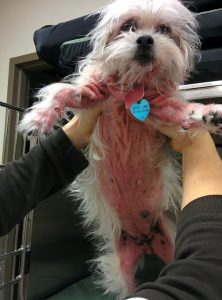Allergic Annie – by Dr. Amanda Glew
As I find myself trying an outfit on our newly adopted 7 pound lhasa cross, my husband makes a comment like “I guess you didn’t have barbies when you were younger.”
This is true, but I would never dress a dog (except for warmth), only in this case it is for allergies. Annie has terrible, terrible skin allergies, and was adopted from another rescue group with this knowledge. Unfortunately, there are some conditions that require long term treatments – and will not have a cure. Severe atopy is one of these

conditions, and unless we are lucky enough to realize a cause (food is the easiest), these cases require daily treatments, supplements and topicals. Annie is one of these cases. Unfortunately, Annie’s owner persisted in thinking that Raw food would be the panacea. It was not in this case. To complicate matters, Annie’s owner has a condition that prevents her from using topicals which are medicated or scented.
At one point during her treatments, I convinced Annie’s owner to let me keep Annie for 4 weeks. I wanted to see how daily, then weekly shampoos, omega 3’s, KO diet, and barrier protectants would help. Well, of course they did – and four weeks later, her skin had greatly improved. She was returned to her owner with the understanding to be re-evaluated in 2 weeks time.
At the two weeks interval, Annie came back and her skin was once again worsening.
I explained to the owner that it would be negligence for her to keep Annie at this time. That she would need to be on long term costly treatment, which included topical medications. Then she told me that she would only relinquish her to me. So I texted my husband and asked him – “can we keep Annie?” My husband, who is a good man, answered correctly. “Of course”.
Two months later, as I wash Annie in my kitchen sink with her medicated shampoo, I dry her, choose her new outfit, sit down and cuddle her on my lap. Her skin is much better, her hair is growing back. She is starting to enjoy toodling around the property, and goes for small walks. She growls at the big dogs. But what she loves most in life is food and cuddles. As soon as I sit anywhere, she is at my knee jumping on me to be picked up. Almost absentmindedly, I find myself doing what I tell clients not to do – giving in.

There are a few lessons to be learned from Annie. It has given me a perspective on how much work it is to deal with this kind of chronic condition. And new admiration for those who do it. It has taught me that not all good-hearted people should be adopting these long term medical conditions. It also tells me that not all rescues should allow these animals to be adopted without the commitment – financial and time wise. It has also given me a new respect for the medications we sometimes have to use. They work if given a chance.
Annie’s story ended well, but there are a lot of these cases that continue to go inadequately treated, resulting in discomfort to the animal for years.
In the meantime, I’ll choose the next outfit for Annie.
Addendum: the owner who had Annie prior to me had taken Annie to see others vets, including a skin specialist here in Montreal and a homeopathic vet in the States with whom she communicated for 6 months. She tried various homemade diets before resorting to raw foods. She made Annie many made-to-measure outfits (which I now own) to protect her from mutilating herself. She gave her weekly baths, although not medicated. She massaged her regularly to ease her discomfort and kept her busy whenever she could to keep her mind off the itchiness. She gave her many cuddles (more than I can probably do with 3 other dogs in the house) and took her for walks. She tried several medications, prescribed by me, and certainly gave them a chance. The only reason she did give them up is because either they made her extremely ill (in the case of oral Atopica) or the benefits had worn off after 2 years (see the picture below which shows Annie on her lap with a great deal of fur). She also gladly agreed to look after Annie whenever I go out of town. So she was a committed owner, the only limiting factor being topical medications. We had discussed it many times- the skin is on the outside, and outside topicals are required.
Annie’s story has ended well, but my point is, this is a severe condition, and medications and treatments will need to be adjusted, weekly, monthly, adding on and taking off medications as needed. It is a lot of work, and should not be foisted on most owners as an adoption.
I never intended to indicate that her last owner was neglecting her. In fact, she made the best decision for Annie in letting her be adopted. It would have been negligence if she kept her and could not keep up with her condition. My apologies if offense was taken by anyone – it has given me a new respect for all clients dealing with chronic conditions in our furry companions. I think many vets need to live this to understand how difficult it is – and how easily we send out instructions without knowing the implications and stress it can be.

 Montreal Dog Blog Montreal's Online Dog Park
Montreal Dog Blog Montreal's Online Dog Park




